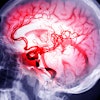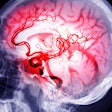
Gum disease treatment may help prevent hardening of the arteries and maybe even major strokes, according to two new research studies being presented at the American Stroke Association's International Stroke Conference 2020.
One research study to be presented the conference, which takes place February 19-21 in Los Angeles, found patients with periodontal disease were twice as likely to experience a stroke due to the hardening of large arteries in the brain compared with people without gum disease. Another study found an association between gingivitis and a higher risk of severe blockage of large arteries.
 Souvik Sen, MD, MPH.
Souvik Sen, MD, MPH."Gum disease is associated with hardening and clot formation in brain vessels that can lead to stroke," Souvik Sen, MD, MPH, an author on both studies and a professor and the chair of clinical neuroradiology at the University of South Carolina School of Medicine in Columbia, told DrBicuspid.com. "Regular dental care may have the additional benefit of stroke prevention."
The first study used data from 265 patients who had a stroke between 2015 and 2017 to investigate whether periodontal disease was associated with a particular kind of stroke. Dr. Sen and colleagues found that large-artery strokes due to intracranial atherosclerosis were twice as common in patients with periodontal disease than those without gum disease.
In addition, patients with periodontal disease were three times as likely to experience a stroke that included blood vessels in the back of the brain. Patients who had a stroke with large blood vessels in the brain were also more likely to have gum disease.
The second study included 1,145 participants from the Dental Atherosclerosis Risk in Communities study who had never experienced a stroke. The researchers used magnetic resonance imaging (MRI) to visualize arteries in the brain.
Participants with gingivitis were twice as likely to have moderately severe narrowed arteries in the brain from plaque buildup compared with those without gum disease. They were also 2.4 times more likely to have severely blocked arteries in the brain.
"Hardening of brain blood vessels is a stroke risk factor which does not have any good treatment," Dr. Sen said. "The study links gum disease to hardening of brain blood vessel. Treatment of gum disease provides an option to prevent the hardening of brain blood vessel."
It's important to note the researchers excluded patients who had tooth loss due to periodontal disease, and they could not confirm a cause-and-effect relationship between gum disease and atherosclerosis. Nevertheless, Dr. Sen found it interesting that two different studies came to a similar conclusion. He's currently conducting a clinical trial to build upon the findings, and he wouldn't be surprised if the link is inflammation.
"The presumed mechanism is that gum infection sets off inflammation in the gum and the rest of the body," Dr. Sen said. "The inflammation promotes cholesterol deposit and atherosclerosis in the blood vessel, including those in the brain. This could lead to a stroke and is similar to the mechanism of a heart attack."



















